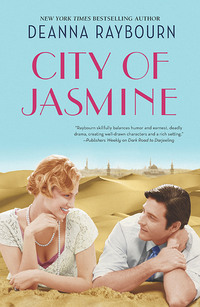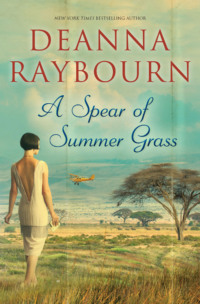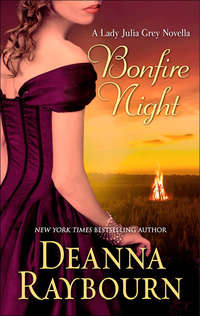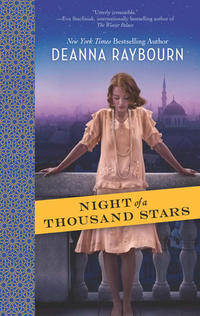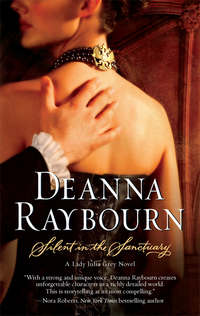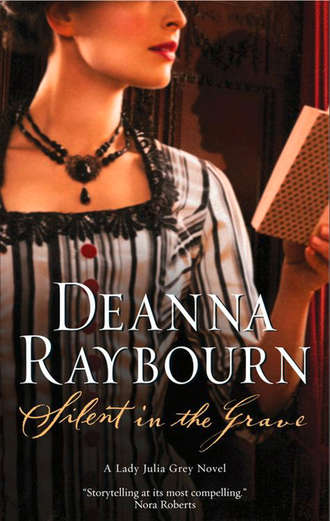
Полная версия
Silent In The Grave
It was weeks before I troubled myself to discover what the serpentine tea leaves actually foretold. By that time, though, the danger was already at hand.
THE FOURTH CHAPTER

Murder most foul, as in the best it is, But this most foul, strange, and unnatural.
—William Shakespeare
Hamlet
My family lasted only as long as the funeral baked meats and libation held out. As soon as the platters were emptied and the decanters drained, they left, and Father took me back to Grey House. It looked different now, with its mourning wreaths and hatchments, muffled door knocker and shuttered windows. The mirrors and servants were draped in black crepe—not a particularly useful or attractive addition in either case. It was the most depressing homecoming I had ever known, and as the door shut solidly behind Father, I felt like the Mistletoe Bride.
Thank goodness for Morag. She took one look at my woeful face, handed me an enormous whiskey and put me straight to bed. I had taken a little chill at the funeral, and for a day or so I luxuriated in blissful irresponsibility. Morag brought me meals on trays, nothing heavy or complicated, but simple, well-cooked dishes suited to my feeble appetite. She instructed Aquinas to turn away all callers and even refused to bring me the daily avalanche of mourning correspondence that continued to descend upon Grey House. The only letters she permitted me to read were those from my family, relations too far or too infirm to make the journey to London for the funeral. Unlike most letters of condolence, these were little masterpieces of originality, full of private family jokes and bits of news calculated to amuse rather than to comfort. My brother Ly sent a highly irreverent epic poem that he had dashed off in the warmth of the Italian sun while sipping a good deal of red wine. His traveling companion, my brother Plum, sent a tiny sketch of me in mourning, with black lace butterfly wings folded in grief. Morag found me weeping over both of them and ruthlessly swept them away with all the other correspondence she had forbidden me.
“You’ll have time enough to deal with that lot when you’re well,” she told me severely. “Now finish your pudding and I will read you summat of Ivanhoe.” I did as I was told. It was just like being back in the nursery—dumplings and pots of milky tea, knightly stories and flannel-wrapped bricks. I was sorely tempted to remain there for my entire year of mourning.
But eventually the tedium defeated me. I finally rose out of boredom, put on my widow’s weeds, submitted myself to Morag’s stunningly bad hairdressing, and went downstairs to begin answering my correspondence.
And if I had expected that to relieve the boredom, I was entirely mistaken. Unlike those written by my family, these notes were invariably brief and unimaginative. They read like a series of practical applications in a guide to writing letters for all occasions, with the same phrases of hollow sympathy running through them all. I suppressed a snort. The sentiments were kindly meant, but these were the very people who would conveniently forget my existence now that I had no husband. It was an awkward business having a widow to dinner, so they would not. When my year of mourning was ended and I could respectably accept invitations, they would mean to ask me, but then someone would point out that I had inherited quite a lot of money and some nervous mama would remember the ugly little spinster she had not yet managed to pry out of her nursery and I would be struck from the list—not out of any personal dislike, but as a simple matter of mathematics. There were not enough gentlemen to go around for the young ladies as it was. Why lessen their chances further by tossing a personable young widow with a sizable purse into the mix? I had seen it happen too often to think that I would be an exception. No, once my year of mourning was finished, I would count myself lucky to be invited to Bellmont’s house for dinner.
I pushed the letters aside and considered my situation. It was not a pleasant exercise. I had a home, but it was a draughty, gloomy sort of place now that I was alone. It had always been Edward’s home rather than mine, and had always reflected his personality. With his charm stripped away, it was a shell, and a theatrical one at that. Edward’s taste had been grander than mine, and all of the rooms had been decorated thematically. From the breakfast room with its birdcage stripes, to the drawing room with its Wedgwood-blue walls, Edward had expressed himself exuberantly. There had been no room left for my personality. Even my bedroom and boudoir had been decorated for me, as a wedding present from Edward. They were Grecian, all white marble and blue hangings. The effect was beautiful, but cold, rather like Edward himself, I thought disloyally.
Only my tiny study, tucked at the back of the house, an afterthought, had been left to my whims. I had brought in an elderly red sofa from March House, its velvet beginning to shred at the seams. There were needlepoint cushions embroidered by my legion of aunts, a cozy armchair that had been my mother’s. The pictures were not particularly good; Edward had commented with wry humour that they were just the thing for an old cottage in the Cotswolds. They were landscapes and portraits of animals, things I had found in the lumber rooms at Bellmont Abbey. They were not valuable, but they reminded me of the country where I had grown up, and I often found myself daydreaming my way into them, walking the painted green hills or petting the fluffy sheep. It was absurdly sentimental of me, but I was deeply attached to Sussex and the memories of my childhood. My mother had died when I was young, but the rest of my life there had been easy and uncomplicated. It was only in London where things seemed difficult.
So, aside from my untidy little bolt-hole, I did not much like my house. Of course, I still had my family, I thought with some cheer. Ranging from the mildly odd to the wildly eccentric, they were some comfort. I knew that they loved me deeply, but I also knew that they understood me not at all. I had never fought a duel or run away with my footman or ridden a horse naked into Whitehall—all acts for which Marches were infamous. I did not even keep a pet monkey or wear turbans or dye my dogs pink. I lived quietly, conventionally, as I had always wanted, and I think I had been something of a disappointment to them.
That left my health and my fortune—both of which could disappear overnight as I had seen often enough. I rubbed at my eyes. I was becoming cynical, and not doing much for my state of mind, either. I put my head down on the desk.
“Darling, is it really so awful?” called a voice from the doorway. I looked up.
“Portia. I did not know you were here.”
“I told Aquinas not to announce me. I wanted to surprise you.”
My sister entered, trailing black scarves and feathers and a cloud of musky rose perfume. She was the only woman I knew who could make mourning look glamorous. She settled herself into Mother’s armchair, cradling her ancient pug against her chest.
“Did you have to bring that revolting creature?”
She pulled a face and nuzzled him. “You shouldn’t speak so of Mr. Pugglesworth. He quite likes you.”
“No, he doesn’t. He bit me last month, remember?”
Portia clucked at me. “Nonsense. That was a love nibble. He loves his Auntie Julia, don’t you, darling?” She cooed at him for a minute, then settled him onto my favorite cushion.
“Oh, Portia, please. Not that cushion. He’s flatulent.”
“Don’t be horrid, Julia. Puggy is nothing of the sort.”
I put my head back down on my desk. “Why did you come?”
“Because I knew you would be contemplating suicide in some highly uncreative fashion and I wanted to help.”
I raised my head just enough to see her. “No, not yet. But I will confess to being completely anguished. Portia, what am I to do?”
She leaned forward, her March-green eyes sparkling. Portia had always been the most beautiful of my sisters, and she knew just how to use her charms to greatest effect.
“You can begin by leaving off the self-pity. It is unbecoming,” she said, her tone faintly reproving. “And don’t pout, either. I tell you these things because someone must. You have had a chance to accustom yourself to Edward’s loss. It is time you admitted it is not a crushing blow.”
I sighed and rested my chin in my hands. “I know. It just feels so awful, so disloyal to admit that I actually feel rather liberated by it.”
“Not at all. How do you think I felt when Bettiscombe died?”
“A bit of a different situation, I think,” I put in, remembering her aging, infirm husband. “It was a merciful release when Bettiscombe passed away. He’d been malingering for years.”
“So had Edward,” she said, a trifle acidly. “We both married sickly men, my darling. The only difference was that we all thought Bettiscombe was hypochondriacal.”
He had been, poor thing. Always taking his temperature and palpating his pulse. He had been forty-five when Portia married him, and he had seemed robust enough at the time. We all thought his throat drops and chest plasters a charming affectation. But during their first winter together at his home in Norfolk, he had taken a chill and promptly died, leaving Portia a rich widow of twenty.
Of course, Portia was not quite as distraught as she might have been. In London, Bettiscombe had been charming and waggish, ready for any jape, so long as he was well wrapped against draughts. In the country, he was a perfect mouse, rising at six and retiring by eight. He fretted over everything without the whirl of London distraction, and had left Portia too often in the company of his spinster cousin and poor relation, Jane. He died before the true nature of their relationship became apparent, and Portia lost no time in returning to London and bringing dear Jane with her to set up house together in the elegant town house Bettiscombe had left her. I knew my widowhood should not prove half so interesting to my family as Portia’s had.
“But you must have felt a tiny prickle of guilt,” I prodded her. Portia frowned. She never liked to be reminded of things she had tucked neatly away.
“Not guilt, not precisely,” she said slowly. “It was rather more complicated than that. But I had my sweet Jane for compensation. And I think you would do rather better if you counted your own advantages rather than mooning about trying to convince yourself that you have lost your one true love.”
“Portia, that is unspeakably cruel.”
Her eyes were sympathetic, but her manner was brisk. “I know that you wish to mourn Edward. He was a lovely person and we were all quite fond of him. But the man you buried was not the child you played with. Do not make the mistake of climbing into his grave and forgetting to live the rest of your life.”
My fingers were cramping and I realized that my hands were clenched. I rose. “Portia, I do not wish to speak of this now. Not to you, not to anyone. I shall conduct myself as I see fit, not to please you or Father or anyone else,” I finished grandly. I swept to the door.
“Hoorah,” she said softly, still not moving from Mother’s chair. “The little mouse is beginning to roar.”
I slammed the door behind me.
I spent the rest of the day in a high sulk, pouting about the evil treatment I had received at my sister’s hands and trying not to think about the possibility that she might have been correct. Edward had been my friend and companion when we were children together in Sussex. Our fathers’ estates had marched together, and Edward and his young cousin, Simon, had often joined in our games and theatricals and expeditions about the countryside. Like all of my sisters, I had come out into society, but I alone had held myself aloof from the few timid advances that had come my way. I suppose, having been raised on stories of knightly adventures and chivalric endeavors, I had been waiting for my very own storybook hero. But it seemed rather heroic when Edward left off of squiring some lissome beauty about the dance floor and came to sip punch with me where I sat by the potted palms. I was not like the other girls; I had no frivolous conversation or pretty tricks to win suitors. I had forthrightness and plainspoken manners. I had a good mind and a sharp tongue, and I was cruel enough to use them as weapons to keep the cads and rogues at bay. As for the young men I might have liked to partner me, I was far better at repelling than attracting. I did not swoon or carry a vinaigrette or turn squeamish at the mention of spiders. Father had raised us to scorn such feminine deceptions. Like my brothers, I wanted to talk about good books and urgent politics, new ideas and foreign places. But the young men I met did not like that. They wanted pretty dolls with silvery giggles and empty heads.
All except Edward. He always seemed perfectly content to sit with me, or even dance with me at considerable risk to his toes. We talked for hours of things other young men would never discuss. People began to talk, linking our names in gossip, and finally, during one particularly painful waltz, Edward smiled down at me and asked me to marry him.
I thought about it for a week. I considered hard whether or not I even wanted to marry. Father said little, but pointed me to the shelf in his library where he housed John Stuart Mill, Mary Wollstonecraft and even, shockingly, some Annie Besant. It was highly discouraging. There were few advantages to marriage for a woman. But there were fewer advantages to spinsterhood. I had already grown tired of the careful whispers behind the fans and the avid eyes that followed me. I was certain that they were saying that I was not the beauty my sisters were, that I would not marry as well as they. Those whispers and glances would follow me the rest of my life if I did not marry, speculating on what frightfulness of mine had driven away any potential suitors. I could not bear that. I was already conscious of how much we were talked about, of how amusing we were to society and how closely to the pale of respectability we walked. Only Father’s close association with the queen and the very ancientness of our lineage preserved us from becoming a complete joke. What I longed for most was normalcy—a quiet, average marriage in an unremarkable home where I could raise my perfectly normal children. That notion was more seductive to me than diamonds. And as a married woman I could travel more easily, have male friends without exciting suspicion, have my own home away from a family that was as maddening as they were delightful. A bit of quiet space to call my own, that is what marriage represented to me.
So I accepted Edward on a chilly night early in spring. Father gave his blessing with the proviso that I spend the summer accompanying Aunt Cressida on her travels. It was the only thing he asked of me, and Edward agreed readily enough. He spent the summer with friends in Sussex while I toured the Lake District with a cranky old woman and her assorted cats. Edward and I were married that December in London. I think I was a happy bride. All I could ever remember afterward were the terrible nerves. I dropped things—my bouquet, the pen for the register—and as I came out of the church, I heard a rooster crow, very bad luck for a bride on her wedding day. For a moment I wondered if it was indeed an omen. But then I looked up into Edward’s smiling face and I realized how foolish I was. Edward was my friend, my childhood companion. He was no stranger to me. How could I fear marriage to him?
In the end, there was nothing to fear. No great tragedies. Just the small troubles, the little tragedies that can dull a marriage and cause it to fray. We had no child, Edward’s health began to fail, we began to follow our own pursuits and spent less and less time together. Edward was pernickety, something I had noted before, but never considered in the context of our life together. It meant that things must be just so for him to be happy. The decoration of the house, the cut of my clothes, the folding of the towels, the laying of the table. I laughed at first and tried to jolly him out of it, but he grew stubborn, and after a while I realized it was easier to let him have his way. The house was kept the way he liked it, my clothes were ordered from his dead mother’s dressmaker, in colours he favored that I knew suited me not at all. But it made him happy, and I cared so little. It was easy to convince myself that these things did not matter. We had been married a few years by the time I caught a glimpse of myself in the glass and realized I did not know my own reflection. I was losing myself a bit at a time, and I did not know how to get it back. My only refuge was my study, where I kept my favorite books and furniture discarded from my father’s homes. In that room I wore an old dressing gown that Edward detested. He learned not to come there, and I learned to lock myself in when I needed to feel like Julia March again, if only for a little while. It was my little den, my nest of comforts for when I felt unruly and savage and found myself itching to rebel against the normality I had thought I wanted. I went there and calmed myself and found peace in letting him have his way yet again. I was always afraid that if I stood my ground, if I argued for scarlet gowns or purple velvet draperies, I would slip too far down the path toward the very thing I was trying to avoid. There was too much colour in being a March, and Edward, with my willing assistance, did all that he could to paint my life beige.
I think, too, that perhaps I gave way so often because I knew that he would not live long. There was always a sense of waiting in our house, watching for the final attack, for a worsening of his symptoms, for the time when the doctor must be called and preparations made. It had made for an uneasy life, and I dreaded the idea that I should have to live it all again with Simon. True, he was not my husband, but I did love him dearly, like another brother, and to know that his time would be so short was almost more than I could bear. A year at most, the doctor had said. And so little to be done for him in the meanwhile.
But what of afterward? I wondered as I sat in my study, contemplating my mourning. What would become of me then? The life I had fashioned for myself as Edward’s wife seemed intolerably small now. And in spite of its size, Grey House suffocated me. The air was dead as a tomb, and the rooms full of memories that I did not wish to preserve. How then to break free of them?
The Ghoul could be persuaded to leave in search of more intimately connected bereavements. Val could simply be told to take rooms for himself or return to Father’s. Grey House would be empty, those enormous rooms echoing coldly. It was big, far too big for a childless widow. I could sell it and purchase a much smaller house, something still near to the park, but on a quieter street. Something elegant and discreet, with a tiny staff, perhaps only Aquinas and Morag, with Cook and a pair of maids and Diggory, the coachman. The battalion of maids that it took to run Grey House could be gotten new places. The footmen were a useless extravagance, they too could be given good characters and let go.
The more I considered the idea, the more excited I became. I found myself walking the rooms of Grey House mentally cataloging what pieces I would take with me and which I would send to the auction house, or perhaps sell with the house itself. There was little I wanted. Almost every painting or piece of furniture carried Edward’s stamp. I wanted to start afresh, with new things I had chosen for myself. It would take a while to settle matters, I realized. Grey House had so many rooms, all fitted with costly furnishings. To arrange for it all to be sold and to fit out a new house could take months. Months I might spend more profitably abroad, I decided. I could shop for new pieces in Paris and Italy, taking a leisurely tour of the Continent as I went. I had been to Paris before, but never beyond, and the notion of Europe tantalized me. So many shops and museums, so much culture and beauty. Opera, paintings, books, concerts, the ideas spun me around and dizzied me. I could take as long as I liked. And to make matters simpler, my brothers Ly and Plum were still traveling in Italy, having discovered that two could live as cheaply there as one could in London. They were artists, one a poet and composer, the other a painter. They would provide me with companionship, sympathy, laughter. And when I needed to be alone, I could simply move on—Perugia, Rome, Capri, Florence—the possibilities were endless. I need not even plan my return, but simply take things as they came, wandering idly from city to city as my fancy took me. The very idea was more intoxicating than any spirit I had ever drunk.
Stealthily, I raided Edward’s library for every book I could find on Italy. I pored over maps, plotting out a dozen different itineraries. I read lives of saints and politicians and princesses and made endless lists of verbs to memorize and temples to visit. Within a few days, I was drunk with Italy and starting to recover quite nicely from the shock of Edward’s death. I knew that I had not come to terms with the vastness of it yet, but I also knew that grief takes its own time. I would distract myself with plans and projects, and would pass my first year of mourning with purposeful occupation. And at the end of it, I believed I would be able to think of Edward with something like fondness, perhaps even nostalgia.
Of course, nothing like that happened, but I do not entirely blame myself. I think I might have pottered along quite civilly had Nicholas Brisbane not come to call. It was a week after the funeral and I was in my study, valiantly trying to twist my tongue and pen around an irregular verb, when Aquinas scratched at the door.
I bade him enter and he did, bearing a salver with a caller’s card. I glanced at it and felt myself flush with guilt. I had meant to write to Mr. Brisbane and thank him for his prompt resourcefulness during Edward’s collapse. At first I simply put it off, dreading the task. After that I had forgotten, enchanted as I was with my paper Italy.
I told Aquinas to show him in at once. I dashed the pen into its holder and thrust my untidy papers into the book of Italian grammar. I was just scrabbling the last stray lock of hair into my snood when Aquinas reappeared with Mr. Brisbane.
I rose, moving around the desk to bid him welcome. I was conscious then of the plainness of the room, its tattered edges that seemed even shabbier when compared to his impeccable tailoring. He was dressed in a town suit that had been cut by a master’s hand; his black leather boots were highly polished, and in his hand he carried an ebony cane, its silver head resting in the hollow of his hand.
“Mr. Brisbane—” I began, but he raised a gloved hand.
“You must permit me to apologize before anything else,” he said, his expression inscrutable. “I know full well the indelicacy of calling upon so new a widow, and you must believe that I would not intrude upon your grief were the matter not one of extreme importance.”
My eyes flew to the desk, stacked high with traveling books, and I felt myself grow warm. “Of course, Mr. Brisbane. I must apologize for my own incivility.” I waved him to the chair and perched myself on the edge of the sofa. He seated himself as a cat will, lightly, with an air of suspended motion that seemed to indicate wariness and an ability to move quite quickly if circumstances demanded. His hat and gloves rested in his lap. He kept the walking stick in his hand, rolling the head in his palm.
I rushed to speak. “I neglected to write to you, to thank you for your dispatch and your resourcefulness the night my husband—” I paused, searching for a word that was neither too vague nor too indelicate “—collapsed,” I finished. It was a weak sort of word, one I would not have chosen had I been speaking to anyone else.
But something about Nicholas Brisbane intimidated me. It was ridiculous that this man, about whom I knew nothing, whose birth and circumstances were likely inferior to my own, should cause me to be so unsettled. Without thinking, I smoothed my skirts over my lap, conscious of the careless creases. He was watching me, coolly, as if looking through a microscope at a mildly distasteful specimen. I lifted my chin, attempting aloofness, but I am certain I did not manage it.


